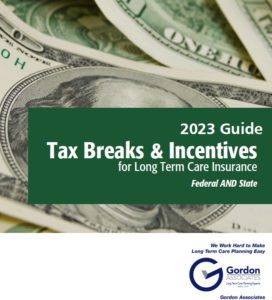Over 50 million Americans have provided unpaid or informal caregiving at some point over the past year. That’s one-in-five Americans–a staggeringly high number. On its surface, informal caregiving may seem to provide some significant benefits to families: it seems inexpensive, it’s familiar, and it probably doesn’t require a large amount of paperwork. But there are significant and lasting downsides, both to caregivers and for those receiving care.
The reality is that many families choose informal caregiving either because 1) other options seem unattainable, or 2) families aren’t aware of other options. This is where Long Term Care Insurance can offer help. Long Term Care Insurance covers caregiving, once the policyholder becomes benefit eligible. The right policy can provide families with the financial security they need to cover caregiving costs while also relieving family members from the burden of caregiving.
Why Do Families Consider Informal Caregiving?
The vast majority of American families will require Long Term Care at some point in their lives. Often, these individuals will also require caregiving. The problem is that it’s often difficult to predict when these needs will arise. You never know when a loved one may tip from self-sufficiency to a place where they need more consistent help.
When caregiving is needed, it can provide a critical medical service. However, families may not have the insurance or financial resources to hire a professional caregiver or professional caregiving services. And even if those resources exist, families may not feel inclined to spend money on a service that they assume a family member can provide.
There is also a certain amount of familiarity that comes with informal caregiving. In some cases, seeing the face of a loved one in a caregiving role may seem more comfortable than meeting a new individual during a challenging time. Unfortunately, many families do not adequately consider the disadvantages and downsides of informal caregiving before making a decision.
How to Think Through Informal Caregiving
Caregiving for adults and family members can be an exceptionally challenging and taxing activity. Families often underestimate the costs involved, which can include the following:
Financial
One of the main reasons families start caregiving themselves is the high cost of hiring outside services. They’re not inexpensive, especially if the hours per day and per week add up. However, what we find many families don’t think about is that informal caregiving takes a significant amount of time and commitment. On the part of the caregiver, this can mean long hours. As a result, adult caregivers often need to put their careers on hold. This can lead to work-life setbacks, lost wages, and lower bargaining power in future career endeavors. Families don’t always plan for the possibility that a spouse or adult child may need to quit their job or reduce work hours to provide care, and this can lead to a diminished ability to pay bills and make ends meet. This can add a significant amount of stress to everyone’s life.
Emotional
In many cases, families will choose informal caregiving because they want to give something back to their loved ones. They want to show appreciation and support, as well as be a familiar and comforting presence during a difficult time. However, it’s important to consider the emotional impact on caregivers. Caregiving burnout impacts between 40-70% of adult caregivers due to the heavy emotional toll this occupation can take. When caregiving, your needs are secondary. You don’t get breaks when you want them. And you don’t get to take unexpected days off. In addition, you are tasked with watching a loved one who may be in pain, uncomfortable, or have demanding needs. This can compound the emotional costs of caregiving.
Physical
When you see a family member having trouble physically accomplishing a task, you want to help! And in that way, informal caregiving can be a rewarding and enriching experience. But as with any workplace or occupation, there are unique physical challenges that come with adult caretaking. For many, in fact, caregiving can be a very physically demanding job. Caregivers are often on their feet for the vast majority of the day. They are also often responsible for assisting individuals with their own mobility, physically moving them from place to place if necessary. This can be physically demanding. And that can lead to physical strain and both acute and chronic injuries. These physical costs can lead to further emotional and financial stressors.
How Long Term Care Insurance Provides a Solution
When you or your loved ones have Long Term Care Insurance (LTCI), you may have more caregiving options available to you when you need them. When the client becomes benefit eligible and meets the policy triggers, coverage for caregiving services is included, such as facility care or home health care. Your family will be better able to afford caregiving services without diminishing your financial resources.
While all policies cover facility and home health care provided by licensed and trained professionals, some plans can include informal caretaking solutions as well. When policyholders purchase a cash indemnity plan, they will simply receive a monthly cash benefit payout. This can then be used to pay whomever is providing care, whether professional or informal caregivers. That means the policy can pay family members who are providing informal caretaking. This flexibility makes cash indemnity plans an exceptionally popular option for those seeking Long Term Care Insurance.
Find a Plan That Works Best for You
It can be challenging to know whether your Long Term Care Insurance plan thoroughly covers any potential caregiving needs you may have. At Gordon Associates Long Term Planning Experts, our specialists can help you understand what your plan offers every step of the way. We can also help you tailor your LTCI policy to best meet your budget, your lifestyle, and your goals.
Informal family caregiving can be an excellent tool for some. But it’s not for everyone, and it can often come with heavy costs. Make sure you have the option to choose what’s best for you and your family. Talk to Gordon Associates about Long Term Care Insurance today!


 To help determine if long-term care (LTC) insurance is right for you, we are offering a FREE informational guide. This is a comprehensive booklet that will answer many of your questions about tax breaks and incentives for LTCI for federal and state taxes.
To help determine if long-term care (LTC) insurance is right for you, we are offering a FREE informational guide. This is a comprehensive booklet that will answer many of your questions about tax breaks and incentives for LTCI for federal and state taxes. To help determine if long-term care (LTC) insurance is right for you, we are offering a FREE informational guide. This is a comprehensive booklet that will answer many of your questions about LTC and assist you with your health care planning.
To help determine if long-term care (LTC) insurance is right for you, we are offering a FREE informational guide. This is a comprehensive booklet that will answer many of your questions about LTC and assist you with your health care planning.